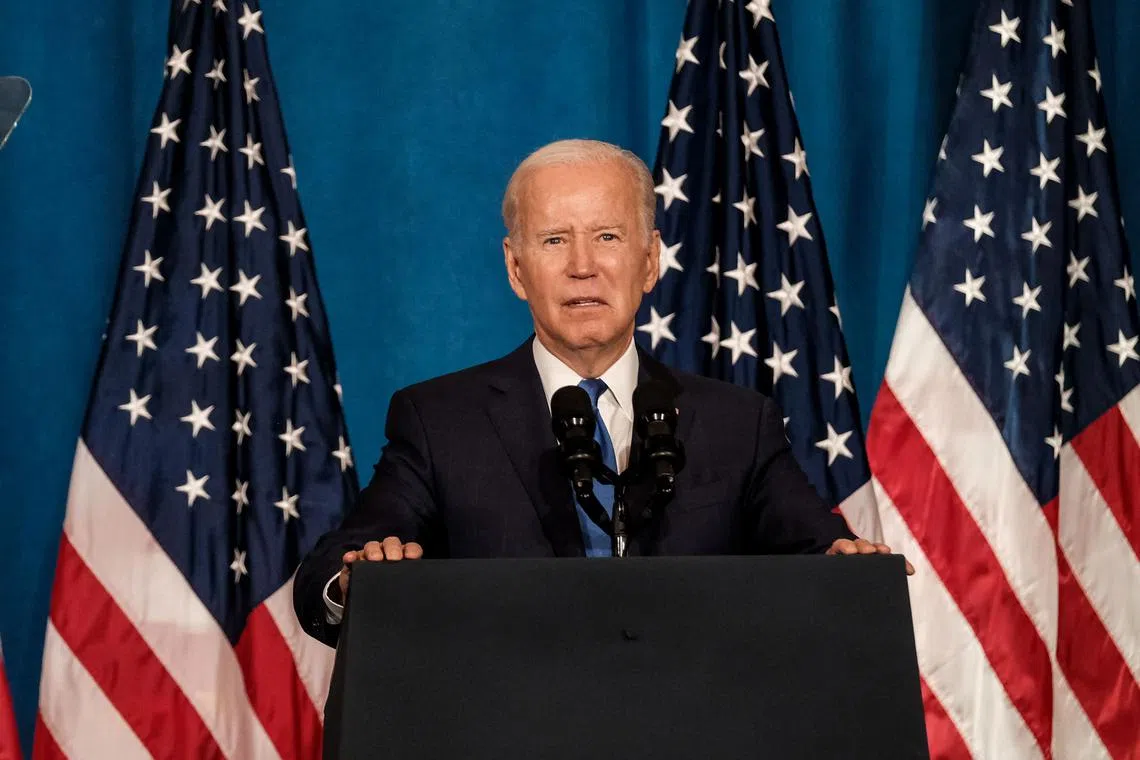President Biden warns of danger to democracy, but voters worry about economy
Sign up now: Get ST's newsletters delivered to your inbox

US President Joe Biden is currently facing low approval ratings.
PHOTO: AFP
Follow topic:
WASHINGTON - President Joe Biden had a grim message in an unscheduled speech in Washington: democracy itself, and the democratic process, is at stake in midterm elections just six days away.
Candidates who refuse to accept the results could set the nation on a “path to chaos”,
However, the message is unlikely to move the needle much in a political environment polarised in the extreme, with opinions firmly baked in, and inflation and the state of the economy at the top of most voters’ minds.
Senate Republican Minority Leader Mitch McConnell tweeted that the President was “desperate to change the subject from inflation, crime, and open borders”.
“Now he’s claiming that democracy only works if his party wins. … Americans aren’t buying it,” he added.
President Biden’s own approval ratings are also low. A Morning Consult poll conducted from Oct 28-30 found 42 per cent approved of the President and 56 per cent disapproved of him.
Pundits predict that in the Nov 8 midterm elections, the Democrats will lose their majority in the House, while the Senate – currently split 50-50 with Vice-President Kamala Harris giving the party a one-vote advantage – remains a toss-up.
Political pundit David Axelrod, former president Barack Obama’s strategist, tweeted: “Issues of democracy are hugely important at this moment and in next week’s election. Totally appropriate for (President Biden) to address them.
“Still, as a matter of practical politics, I doubt many (Democrats) in marginal races are eager for him to be on TV tonight.”
The speech did not contain anything new; the President had made the same points previously.
But it was sharp, and began with him recounting the attack earlier this week on 82-year-old Paul Pelosi,
He was assaulted by a man who broke into the couple’s San Francisco home in the middle of the night looking for Mrs Pelosi, who was in Washington.
The man, now in custody facing charges including attempted murder and kidnapping, was equipped with plastic zip ties and duct tape and planned to break Mrs Pelosi’s knees. As police arrived, he hit Mr Pelosi on the head with a hammer. The latter sustained injuries to his skull and right arm and remains in hospital, though apparently out of danger.
“American democracy is under attack because the defeated former president… refuses to accept the will of the people,” President Biden said.
Extreme “Maga” elements are a minority in the Republican Party but are driving the party, he charged.
Maga or “Make America Great Again” is the slogan and movement of former president Donald Trump, who continues to maintain that he was the rightful winner of the 2020 election – though no evidence of that has stood up in any court of law despite scores of legal challenges to the results.
Yet polls show that about 70 per cent of Republicans do not think President Biden was the legitimate winner of the 2020 election. And in one poll in September by Axios-Ipsos, as many as 42 per cent of Republicans said strong, unelected leaders are better than weak elected ones. Among Democrats, the figure was 31 per cent.
There are more than 300 election deniers on the ballot in the midterms, Mr Biden warned.
“We can’t take democracy for granted any longer,” he said in the speech at Union Station, just three blocks from the Capitol.
“There are candidates running for every level of office in America… who won’t commit to accepting the results of the elections they’re in,” he said. “That is the path to chaos in America. It’s unprecedented. It’s unlawful. And it is un-American.”
The speech was strong, but those who needed to hear it the most were probably not listening, Professor Charles Zelden, historian and political scientist at Nova Southeastern University in Florida, told The Straits Times.
“It comes down to how many people were watching, how many were actually listening, and how many of those can be convinced – and sadly the numbers get smaller,” he said.
Dr Glenn Altschuler, Professor of American Studies at Cornell University, told ST: “The threat to democracy is indeed a serious threat, perhaps unprecedented since the Civil War.”
“The challenge is that everything now is viewed through a partisan lens. And when you have divisions that are this deep, and fuelled by conspiracy theories, it’s very difficult to successfully get people to listen to the warnings,” he said.
“Undoing the partisan divide that we have now is a very, very tall order,” he added. “It’s difficult to get people to reconsider what has become an embedded, strongly held set of views and principles and beliefs.”


